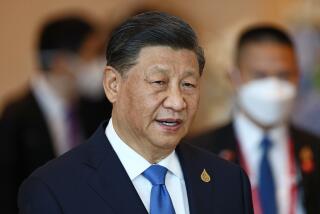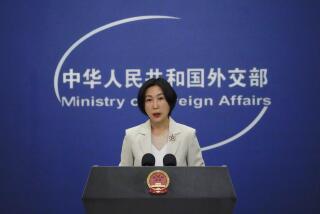China Rebuffs Soviets on Summit, Cites Cambodia
- Share via
BEIJING — The Chinese government Tuesday rebuffed Soviet leader Mikhail S. Gorbachev’s appeal for a Sino-Soviet summit, repeating China’s demand that Moscow first end its support for the Vietnamese occupation of Cambodia.
A Foreign Ministry spokesman, in China’s first reaction to Gorbachev’s proposal Monday, said senior leader Deng Xiaoping “has made quite clear the conditions for a high-level meeting between China and the Soviet Union.”
“At present it is the strong aspiration of the international community that Vietnam should withdraw all its troops from Kampuchea (Cambodia) promptly,” the spokesman said. It was the second time in two months that China had rejected an appeal from Gorbachev for a summit.
The Soviet leader, in an interview with the Chinese weekly magazine Outlook, called for the first Sino-Soviet summit since 1969, when Premier Alexei N. Kosygin met with Chinese Premier Chou En-lai.
Before that, the last summit meeting took place in 1959 between Mao Tse-tung and Soviet party leader Nikita S. Khrushchev, a year before the two Communist nations split over ideological issues.
In his interview with Outlook, Gorbachev repeated his call for a summit with Deng “in Moscow, Beijing or any other locale,” suggesting that summits could be held before all problems are solved. The summit would be an attempt to heal more than 25 years of feuding between the two countries over ideological, political and territorial disputes.
Deng first raised the possibility of a Sino-Soviet summit in September, 1986, saying he would consider it if Moscow ended its support for Vietnam’s nine-year-old occupation of Cambodia.
Deng has said he is willing to meet Gorbachev either in the Soviet Union or China. But he says a precondition must be Soviet action to compel Vietnam to end its military intervention in Cambodia.
Cambodia Main Obstacle
Beijing has long described the occupation of Cambodia as the most important of “three major obstacles” to better ties with Moscow. The others are the Soviet Union’s occupation of Afghanistan and its heavy concentrations of troops along China’s northern border.
While the Soviet Union is Vietnam’s key supplier, China is the chief weapons provider to Cambodian rebels fighting to oust an estimated 140,000 Vietnamese troops from the country and topple the Hanoi-backed government installed in Phnom Penh after Vietnam’s invasion of December, 1978.
Relations between Moscow and Beijing have been sour since the early 1960s. Ties have improved slightly since Deng came to power in 1978, with both sides reporting progress in regular talks on border disputes and normalizing relations.
But East European sources and Western diplomats noted that there has been little substantive improvement in political relations since Gorbachev came to power in March, 1985, despite a rapid increase in cultural, sports and trade exchanges.
More to Read
Sign up for Essential California
The most important California stories and recommendations in your inbox every morning.
You may occasionally receive promotional content from the Los Angeles Times.













